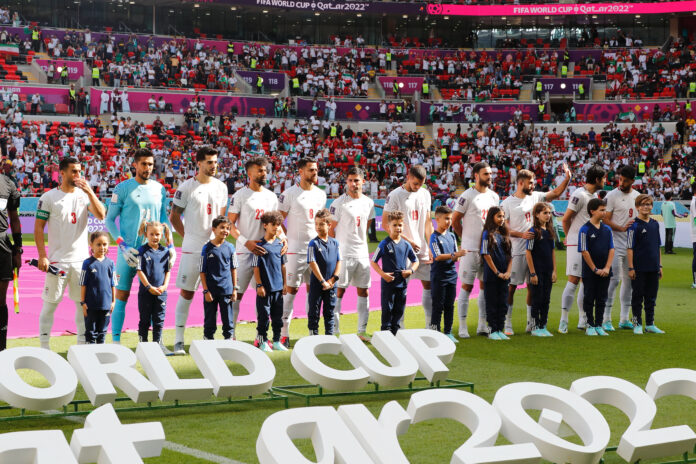
By Potkin Azarmehr
“Iran’s soccer players refuse to sing their national anthem ahead of the World Cup opening match”.
This is how many Western media outlets have reported the single unanimous act of defiance displayed by Iran’s football players at their inaugural game against England on Monday Nov. 21.
What the Western media misunderstood was that Iranians do not consider the anthem to be their “national anthem”. It is the Islamic Republic’s anthem, not Iran’s national anthem.
[aesop_image img=”https://kayhanlife.com/wp-content/uploads/2022/11/2022-04-14T000000Z_4784204_MT1NURPHO0000FTL7K_RTRMADP_3_IRAN-POLITICS.jpg” panorama=”off” credit=”Commander of Islamic Revolutionary Guard Corps’ (IRGC) Quds Force, Esmail Qaani (Bottom C) wearing a protective face mask stands at attention while the regime’s anthem playing during a ceremony in the Interior Ministry building in downtown Tehran on April 14, 2022. REUTERS./” align=”center” lightbox=”on” captionsrc=”custom” captionposition=”left” revealfx=”off” overlay_revealfx=”off”]
Perhaps the translation of the lyrics of this anthem will offer some explanation:
As the sun rose from the horizon in the east,
The vision of the believers shined for justice
The month of Bahman [when the Islamic Revolution prevailed]
Became the coronation of our faith
Your message, Oh Imam [Khomeini]
Independence, freedom, became the imprint of our lives
Your roar, oh martyrs! Will be heard through the ages
May you forever stand
The Islamic Republic of Iran
Clearly, the only time that the word ‘Iran’ is mentioned is in the last verse — wishing for the “Islamic Republic of Iran” to remain forever standing. Only a regime supporter can happily sing such an anthem.
National anthems ought to be all-inclusive hymns which all citizens are willing to sing regardless of their political affiliation.
The Islamic Republic’s anthem is not the only symbol of national identity that has been hijacked in favour of the ruling Ayatollahs. The national flag, which was changed shortly after the revolution, is another symbol that no longer represents Iran.
Inscribed in white, in Arabic kufic script, and repeated 11 times on the inner edges of the green and red bands is the phrase Allahu Akbar (Allah is the Greatest).
The centuries-old lion-and-sun emblem of Iran — the national insignia that once featured in the flag’s middle white band — has also been replaced with the word “Allah” in a stylized font that recalls the Sikh faith’s Khanda symbol rather than anything Iranian.
Ever since the Ayatollahs came to power in Iran in 1979, Iranian nationhood and Iran’s national interests have been replaced with an ideology. This ideology is the doctrine established by Ayatollah Ruhollah Khomeini: that of establishing an Islamic Republic through the rule of velayat-e faghih, usually translated as the Guardianship of the Islamic Jurist.
This doctrine was first formulated by Khomeini in 1970 while he was in exile in Iraq. After the 1979 revolution, Khomeini updated it to the Absolute Guardianship of the Islamic Jurist.
According to the updated version of Khomeini’s vision of political Islam, the leader of the Islamic Republic is God’s representative on Earth, with unlimited powers that can include suspending or even abolishing the tenets of Islam for the preservation of the regime. In this ideology, the nation is replaced by the Ummah, the Community of Muslim Believers. Nationalism, patriotism and any reverence for Iran are considered non-Islamic concepts.
Even the new institutions that were created by the Islamic Republic rarely include Iran in their title. For example, the IRGC, the Islamic Revolutionary Guards Corps — a military outfit established in parallel to Iran’s regular army — deliberately omits Iran from its title. Its duty is not to protect Iran or its borders, but rather to preserve the Islamic Revolution.
Western reporters and Iran observers ought to endeavor to explain these crucial nuances.
Refusing to sing the Islamic Republic anthem, or refusing to wave the post-revolutionary flag, are in fact acts of patriotic defiance against the ideology that Khomeini has imposed to negate the great nation that is Iran.
Soccer-Fans Brace for Politically Charged U.S.-Iran Match at World Cup

